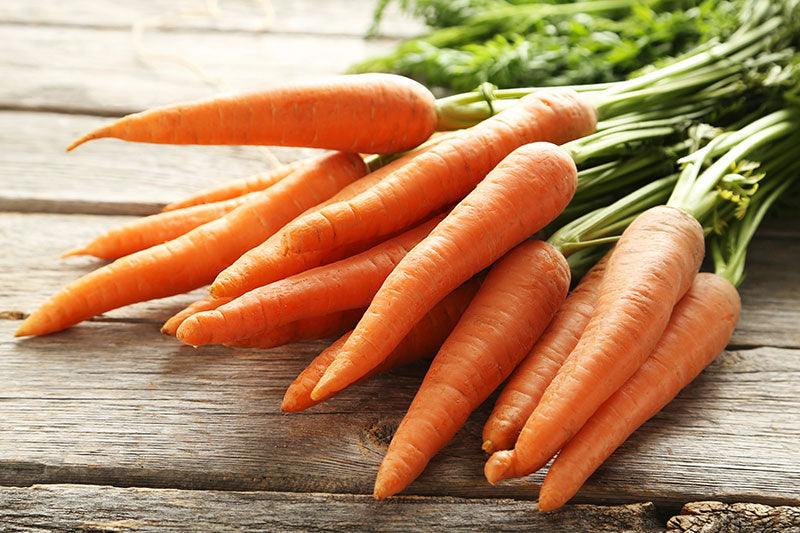








- Description
- Which ingredients do we use & why?
- Why Cooked Food?
- Feeding Guide
A light and easily digestible meal made from 70% gently cooked chicken combined with crunchy sweet potatoes, fresh vegetables and tasty fruit. Supplemented with valuable, natural minerals and valuable linseed oil. The menu is rounded off with a hint of sage.
We only use fresh, food-grade ingredients for our fresh chicken menu in our in-house pet food kitchen. High-quality chicken meat and offal are cooked slowly and gently at low temperatures. Only then do we add blanched sweet potatoes, carrots, peas, pumpkin and apples, as well as linseed oil, rosehip, algae lime, brewer's yeast, seaweed meal and sage to the cooked food. This ensures that flavour and nutrients are optimally preserved.
No high temperatures, no fillers, no artificial vitamin supplements, no extrusion, no sterilised cans. The result: Like home-cooked, healthy food with all the nutrients from the fresh original ingredients that tastes just as good as it looks. 100% natural and 0% artificial additives. Developed with vets and made with love. Quite simply the best food for your dog. The result is an unrivalled, healthy fresh meal for your dog. Just like home-cooked.
Composition
70% cooked chicken (of which 80% chicken meat, 20% chicken giblets: heart, kidney, stomach, liver), 7% sweet potatoes, 7% carrots, 6% peas, 4% apples, 3% pumpkin, 1.9% linseed oil, 0.4% rose hip, 0.4% algae lime, 0.1% brewer's yeast, 0.1% seaweed meal, 0.1% sage.
Analytical components
Protein 12.1%, Crude Oils and Fat 5.6%, Moisture 69.4%, Crude Ash 4%, Crude Fibres 0.6%.
Complementary feed for dogs.

Freshly Cooked Chicken (70%, of which 80% chicken meat and 20% chicken innards: heart, kidney, stomach, liver)
Chicken meat is considered particularly lean and offers many benefits for our furry friends: it provides high-quality protein without being too high in calories. It is rich in omega-6 fatty acids, supports skin health and ensures a shiny coat. It is an excellent source of essential amino acids and glucosamine, which promotes bone health.

Sweet Potatoes (7%)
According to the American non-profit organisation Center for Science in the Public Interest (CSPI), sweet potatoes are considered to be the healthiest vegetable of all. The greatest benefits of sweet potatoes are their high content of phytochemicals, which protect against free radicals. They are a source of minerals and vitamins and contain a lot of high-quality fibre.

Carrots (7%)
In addition to energy, fibre and low calories, carrots are healthy because they are an excellent source of vitamins and minerals. Vitamin A and biotin are particularly worth mentioning here. Carrots are rich in beta-carotene, which is converted into vitamin A in the body.

Peas (6%)
Peas contain many vitamins. In addition to beta-carotene, peas are particularly rich in B vitamins and also contain vitamin C. Peas also score highly in terms of minerals: Magnesium, iron, calcium and zinc make them a particularly healthy vegetable side dish.

Apples (4%)
Apples are suitable for a healthy diet because they contain many vitamins, minerals and trace elements such as potassium, calcium, B vitamins, vitamin C, vitamin E, folic acid, pectins and polyphenols.

Pumpkin (3%)
Pumpkin provides many vitamins, including beta-carotene (as a precursor to vitamin A), vitamin C and vitamin E. Minerals such as potassium, magnesium, calcium and iron as well as satiating fibre are also included. Fibre also aids digestion.

Linseed Oil (1.9%)
Linseed oil contains a high proportion of unsaturated fatty acids such as omega-3 or linoleic acid. According to scientific studies, linseed oil can have a preventative and soothing effect on diseases such as diabetes, arthrosis and high cholesterol levels. However, the actual effects have not yet been sufficiently proven.

Rosehip (0.4%)
In addition to vitamin C, rosehips also contain numerous other ingredients that have a positive effect on health. These include: Fruit acids, essential oils, pectins, tannins, silicic acid, the antioxidants lycopene and flavonoids, the vitamins provitamin A, vitamin B1 and B2 as well as vitamin E, the minerals zinc, copper, sodium, phosphorus, iron, calcium and magnesium.

Algae Lime (0.4%)
Algae lime consists of deposits of red algae. It contains mainly calcium carbonate, as well as magnesium carbonate and trace elements (boron, iodine, silicic acid) and thus prevents a deficiency of minerals and trace elements. The high calcium content supports the stability of bones and teeth and balances out the excess phosphorus from meat feeding, which can otherwise lead to kidney problems.

Brewer's Yeast (0.1%)
Brewer's yeast contains lots of vitamins and minerals and is also a good source of protein. It also stimulates the metabolism and helps to keep blood sugar levels constant.

Seaweed Powder (0.1%)
Seaweed meal contains many minerals such as zinc and carotenoids which support the skin metabolism and the pigmentation of the coat, nose and paw pads. The amino acid lysine it contains optimises feed conversion; cellulose and mannitol support digestion.

Sage (0.1%)
Sage has a stimulating effect on intestinal functions and the gall bladder due to its bitter substances. The formation of digestive juices in your dog's stomach is stimulated, so sage can help to reduce flatulence and digest fat better.
Is everything in there?
As a holistic vet, Anita Kröger attaches particular importance to a species-appropriate, natural and varied diet when it comes to dog health. From the perspective of holistic veterinary medicine, nutrition plays a key role in a dog's long and healthy life. The vet and founder of the Centre for Canine Health specialises in the treatment of chronic diseases in addition to providing medical nutritional advice. She specialises in intolerances, allergies and gastrointestinal diseases.
The Fidelis Difference: Gentle Processing, Superior Quality
The gentle steam pre-cooking of our meat allows for sterilization in jars at significantly lower temperatures and shorter dwell times. This keeps the meat in nice, chunky pieces, not overcooked mush.
Thanks to the pre-cooking, less water evaporates during sterilization, eliminating the need for artificial binders commonly used in canned food. These binders, often not listed on ingredients labels, can potentially trigger allergies and other health issues.
By using only fresh, high-quality ingredients without binding agents, our fresh food in jars boasts a fresh, delicious aroma, a world away from the typical unpleasant smell of canned food. Gentle preparation also preserves more nutrients from the original ingredients, minimising the need for artificial vitamins with a varied diet.
Glass: The Healthier Choice
Fidelis fresh food in jars offers additional advantages over canned food. Glass eliminates the risk of metal particles or coating residues contaminating the food. Residues from tin cans have been linked to cancer and other diseases. Glass simply doesn't leach any harmful substances. It's no wonder baby food is primarily available in glass jars.
The glass are also resealable and bad odours from opened cans in the fridge are a thing of the past. The result: fresh-smelling, healthy, wholesome menus for a species-appropriate, varied and digestible diet for your dog. Just as practical as tinned food, only much better.
Fidelis Fresh Menus are thus absolutely unique and simply put: "Better Food" for your dog! We cook for your dog just like you would at home.
Disadvantages of other types of food
What are the disadvantages of other types of dog food compared to the cooked fresh menus from Fidelis?
Extruded/Cold-Pressed Dry Food::
Almost always made with a significant amount of grains, animal meals, and hardened fats. Fresh ingredients like meat, offal, and vegetables are used in very small quantities or not at all. The extrusion or cold pressing process heats the product to very high temperatures, destroying most remaining nutrients and minerals.
- Vitamins and minerals are artificially added.
- Dry food often contains preservatives and attractants.
Wet Food/Canned Food::
Most manufacturers use low-quality meat and slaughter by-products, plant by-products, and artificial additives for can production. Fresh ingredients like meat, offal, and vegetables are used in very small quantities or not at all. The sterilization process in autoclaves during canning heats the food to a temperature of 110–140°C, resulting in the loss of a large portion of nutrients and minerals.
-Vitamins and minerals are artificially added.
-Canned food often contains preservatives and attractants.
B.A.R.F. (Biologically Appropriate Raw Food):
The concept of feeding dogs biologically appropriate raw food, including meat, offal, vegetables, and fruits, has merit. However, raw, untreated B.A.R.F. products can be a significant problem. They are often contaminated with a high number of germs and bacteria, which can lead to intolerance or digestive difficulties for the dog and pose serious health risks for the owner during thawing and preparation. Enterobacteria and E. coli bacteria can cause severe health problems in both dogs and humans. The protein content in B.A.R.F. menus is often too high, leading to health problems in many dogs.
Daily Feeding Guide
This guide provides a starting point for the amount of food to feed your dog daily.
Puppies up to 8 months: approximately 4.5% of body weight
Dogs up to 15 kg: approximately 2.5-3% of body weight
Dogs over 15 kg: approximately 2.5-3% of body weight
Example: A 20 kg dog with a recommended daily allowance of 2.5% would need 500g of food per day (20 kg * 2.5% = 500g).
Please Note:
These are guidelines for healthy, active, non-neutered dogs. Individual needs may vary by up to 50% based on age, breed, or activity level.
Adjust the amount of food based on your dog's individual needs to maintain a healthy weight.
Transitioning to Fidelis
Fidelis recommends switching your dog's food immediately. Skip one meal (preferably in the evening) and start with our food at the next meal. Feed a single flavour for the first 14 days to allow your dog's stomach to adjust. After two weeks, you can alternate between different flavours.
Delivery & Storage
Our fresh menus in a glass are delivered to you in protective packaging with 6 glasses each. For this reason, the minimum order quantity is 6 glasses and then always 6 more. Our fresh menus in glass have a shelf life of at least 1 year. After opening, we recommend storing the menus in the refrigerator and using them within 3-4 days.









